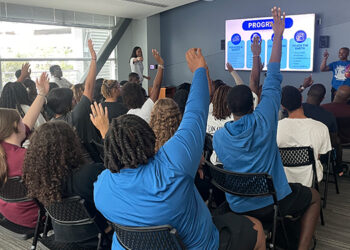On May 1, 2020, Campus Rec Magazine hosted the COVID-19 Virtual Roundtable: What’s Next?
Panelists included Kirk Fallon, the director of the Student Recreation Center at Red Rocks Community College; Laura Hall, the senior director of Campus Recreation at Pennsylvania State University (Penn State); Chris Hoppe, the associate director of Campus Recreation and outdoor programs at Eastern Washington University; and Emily McElwain, the director of Student Recreation at Colorado State University Pueblo (CSU Pueblo).
Below are some of the top takeaways from the roundtable:
Budget Cuts
Campus recreation centers are facing the reality of budget cuts. Hall said they have taken a proactive manner and budgeted scenarios for 5, 10 and 15% reductions. But before they even did that, Penn State Campus Recreation created a set of assumptions to come back to when hard decisions due to budget cuts will have to be made.
McElwain said right now there are reduced rates and free offerings for students. With a budget cut, they would have to transition to a pay-for-play model for programs like Intramurals. “The priority is making sure staff are employed and the building is open, operational and well-maintained,” she said. “Then secondary to that comes the subsidized programs.”
That focus on professional staff comes with a realization staff might need to step up into certain roles. McElwain explained instead of canceling an outdoor adventure trip due to lack of student staff, a professional staff member might have to lead it.
Over at Red Rocks, Fallon said in light of budget cuts, they are looking at how to continue to provide annual events and popular programs while scaling back. He noted they would be “almost Dollar Store versions of these events,” but the outcomes and impact would remain the same. It’s about getting innovative with what’s out there.
Keeping It Clean: Locker Rooms, Climbing Walls, Etc.
While sanitization is key, Hoppe said it starts with reducing contact of surfaces and people in the first place. “Reduction and prevention are where we are going to focus our efforts,” he said.
For example, McElwain said every single staff member will have a reusable mask. In fact, they have also discussed adding the full PPE gowns to their first aid kits, including the faceguards.
In terms of locker rooms, McElwain said during summer they are underused. However, when it comes to the pool locker rooms, those are more concerning. They will consider monitoring the spaces to make sure the social distancing capacity is maintained.
For Fallon, he mentioned shutting down locker rooms could affect those students with housing insecurities whose only shower for the day could be at the rec center. As such, it’s important to do what is necessary to keep them open. One idea he offered is to make a row of lockers available and rent out every third locker.
Climbing walls were another area of discussion. Hall said they will be relying on the Association of Outdoor Recreation and Education, Eldorado, and other industry experts. More route setting will probably have to happen to ensure holds are being cleaned on a more regular basis.
However, McElwain said as most things being decided now, if they are unable to meet guidelines of social distancing, they will simply keep the wall closed.
Planning for a Second Phase of COVID-19
August is when Red Rocks is scheduled to open, and Fallon noted that is plenty of time for COVID-19 to grow. So, the key to surviving the pandemic now and later is being adaptable.
McElwain said they are simply taking things slow, having a phased approach to reopening. That way if there is a second phase of the coronavirus they will have to close having been only partly open. “We’re not just throwing up the garage door and saying we’re back to normal,” she said.
But McElwain did note if commercial centers around them reopen, they will face pressure to do the same. However, CSU Pueblo will follow state recommendations concerning higher ed. That is the message the surrounding community will be told. So, while they may lose members, they need to do what protects the university and keeps students safe.
At Eastern Washington, Hoppe also said they are ready to operate at a range of levels. However, his biggest challenge has been having to put the brakes on staff on policy drafting. “We are just being nimble and ready to adapt as necessary,” he said.
Hall echoed the nimble approach. She believes there will be a continuum of ramping up and ramping down for a while. All in all, no ideas are off the board for the future of reopening campus rec.











